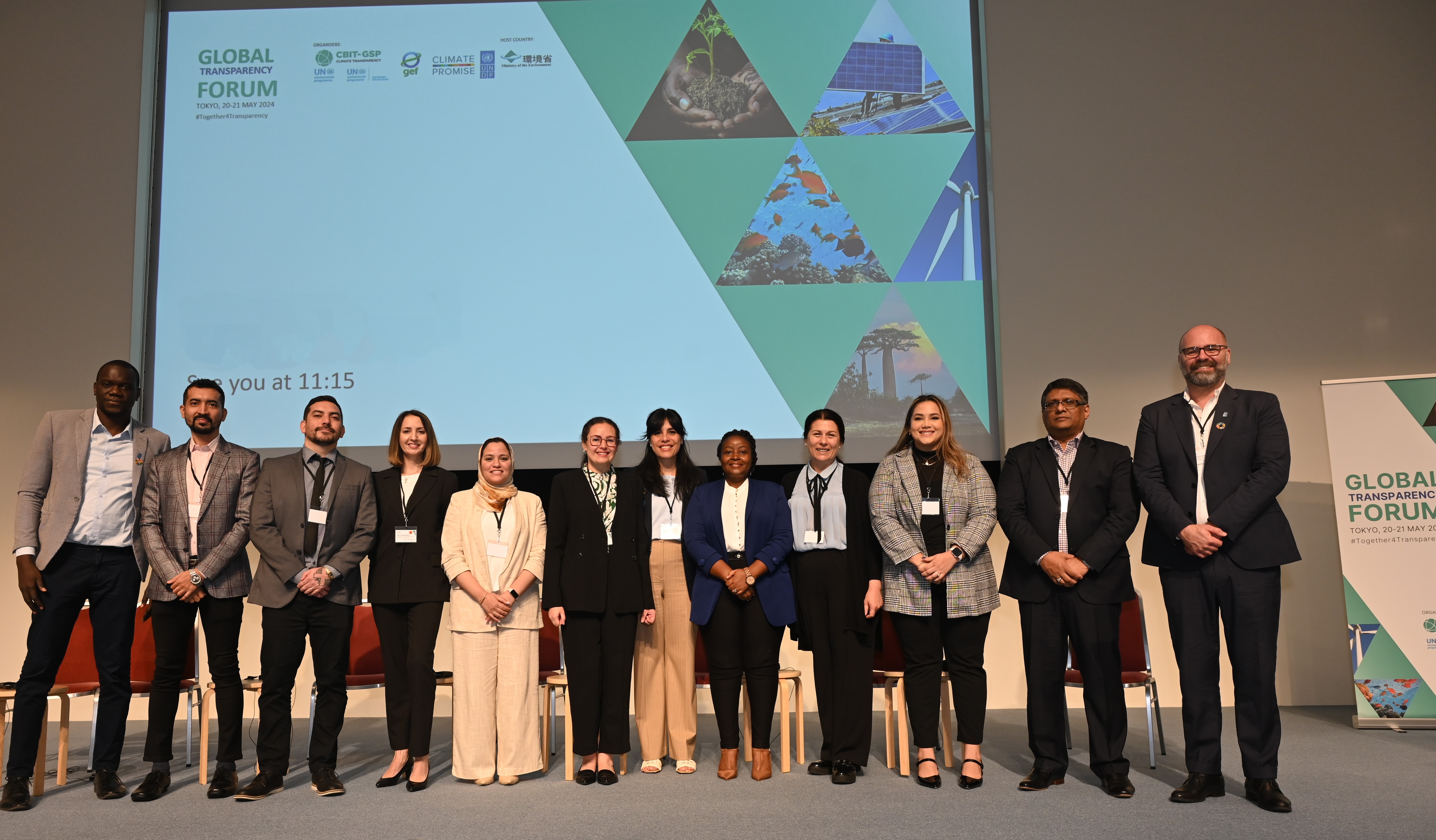As of December 31, 2024, 46 countries submitted their BTRs with direct CBIT-GSP support, ranging from hands-on guidance for all elements of the BTR, to quality checks prior to submission. Many more countries benefited from other CBIT-GSP support modalities including regional in-person trainings, online workshops and ample webinars, primarily delivered through its ten Transparency Networks, two of which are implemented with the support of UNDP.
Transparency Networks are geographic and linguistic country groupings, covering all developing countries globally. These groupings ensure that countries can effectively engage with technical content and interact with each other, creating a sense of community. Transparency Networks engage with countries and provide technical insights through a mix of virtual and in-person activities, notably webinars and regional trainings respectively.
Peer-to-peer learning is a key element of the CBIT-GSP capacity building support, and dedicated programs such as the Mutual Learning Programme (MLP). The MLP is supported by the Institute for Global Environmental Strategies (IGES), with funding from the Ministry of Environment Japan, and pairs countries with similar needs and interests to work on select transparency areas, facilitating a direct exchange and learning.
The MLP has been implemented in the Eurasia and Central Asia and the Caucasus networks to address countries’ challenges in reporting mitigation actions such as completing Common Reporting Tables (CRTs) for National Inventory Reports, and Common Tabular Formats (CTF). The MLP helps countries to uniformly collect and report the information necessary to track progress on their Nationally Determined Contributions (NDCs) and appropriately use domestic data while gaining insights from the experiences of peer countries.
“The comprehensive review of greenhouse gas (GHG) inventory estimations across sectors, insightful comments and recommendations, and the one-on-one sessions with sector-specific experts significantly enhanced the quality and accuracy of our report,” said Rauf Hajiyev, Deputy Minister for Ecology and Natural Resources, Republic of Azerbaijan, member of the Central Asia and Caucasus network.
CBIT-GSP holds regional in-person trainings annually in all networks, providing targeted technical knowledge on select transparency areas such as GHG inventories and NDC tracking. GHG inventories are one of the key elements in BTRs, providing an overview countries’ emissions and removals, and tracking countries’ progress against their NDC climate goals is central to monitoring progress. In some cases, the trainings combine different networks such as the training on preparation and reporting of results of national GHG inventories for the Asia, Pacific and MENA Transparency Networks.
Webinars provided another medium for countries to engage and share lessons learned within the networks. For example, a webinar series in the Middle East and North Africa Transparency Network took participants through all key stages of producing a national BTR. The webinar series began in June 2024, introducing network participants to the BTR roadmap tool developed by the Partnership on Transparency in the Paris Agreement (PATPA) and the Food and Agriculture Organisation (FAO). Over six months the series covered institutional arrangements for transparency systems; tracking NDC mitigation commitments; and editing and updating content in the climate transparency platform. CBIT-GSP also organized specific activities for Morocco to ensure alignment with the requirements of the ETF.
“The sessions provided by CBIT-GSP were highly beneficial for national experts, enhancing their capacities in new areas that required in-depth explanations. These included two in-person trainings for national GHG inventory actors on the IPCC software, covering the energy, agriculture, LULUCF, and waste sectors using real data, as well as a hands-on session on completing the CTF tables for the NDC Tracking Chapter and its Quality Assurance. Additionally, to the support provided by FAO on the GHG inventory for the LULUCF sector, focusing on QA and filling in the CRTs. The journey was challenging, but we are extremely proud of the work accomplished by each stakeholder and national expert,” said Ms. Andalus Ben Driss, National Coordinator of the First BTR, Fifth National Communication, and CBIT project.
In addition to regional activities, countries can request direct support from CBIT-GSP for targeted activities to address limits in technical capacities for reporting under the standards of the Enhanced Transparency Framework (ETF) of the Paris Agreement. This support ranges widely from the development of BTR Roadmaps, capacity-building on using the IPCC Software and modelling tools, and mainstreaming gender into reporting.
In other cases, countries such as The Gambia requested hands-on capacity building support from CBIT-GSP in October 2024 on every aspect of the ETF and IPCC 2006 guidelines, as well as the interoperability of the two reporting tools. Similarly, Indonesia received capacity building support for its BTR via a five-day workshop in August 2024. Indonesia received support on the application of IPCC and UNFCCC tools and systems for reporting inventory data; completing CRTs and CTFs; linking NDC tracking with GHG inventory; and reporting on adaptation actions and support needed and received.
Another key component of CBIT-GSP support has been the pre-submission checks for the various elements of countries BTRs. These checks focused on completeness and clarity in the reports and gave countries collaborative feedback on important elements to include in their BTRs prior to submission to the UNFCCC for formal review.
CBIT-GSP specialists who commented on the reports were also keen to enhance countries’ identification of capacity gaps and needs. This latter step is crucial for enabling future donors to appropriately allocate technical and financial support to countries, and for countries to understand what they require to realistically refine the production of their next NDC.
“Comprehensive reviews were undertaken on GHG Inventory calculations, the National Inventory Report, the NDC tracking section, CRT, and CTF tables … These reviews and verifications … were essential in ensuring the accuracy, completeness, and consistency of our reporting,” notes Azerbaijan’s BTR, with Lebanon, Colombia and Ecuador also acknowledging the important support of CBIT-GSP quality checks.
As this was the first BTR all countries had submitted, many experienced cross-cutting challenges related to data availability and the use of data to meet higher tiers of IPCC and other transparency reporting requirements, as well as a lack of experience in the methodologies or data necessary for completing the report. Many countries also identified required support for elements that will help them continue to enhance their mitigation efforts, such as identifying suitable indicators for NDCs, and having the appropriate methodologies to carry out projections assessments.
With the submission of the first BTR, the transparency journey has only begun. Now countries have to undergo a technical review process of their BTRs and start preparing for the subsequent BTRs. Several countries are still in the process of preparing their initial BTR. CBIT-GSP, with the support of UNDP and other partners will continue its support to countries to improve reporting over time and stands ready to receive requests from countries.



